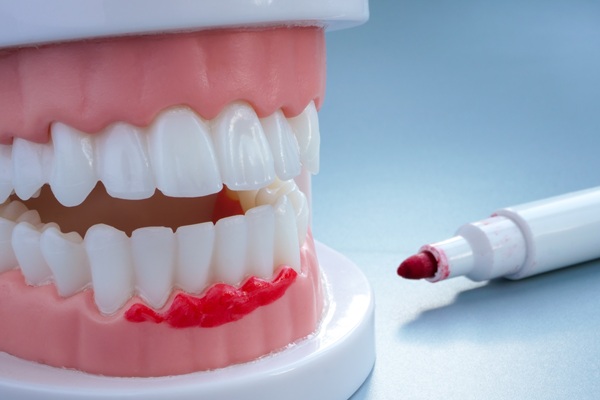Gum Recession Treatment From a Periodontist

Gum recession is a condition where the gum tissue surrounding the teeth pulls back. A periodontist can provide gum recession treatments to minimize discomfort and prevent it from progressing and causing more severe dental issues. By seeking care promptly, patients can restore gum health and protect their smiles.
A closer look at gum recession
Gum recession is common but treatable. The sooner a patient gets treatment, the easier and less invasive treatment will be. Since this condition involves gum tissue pulling away from the teeth, it exposes more of the tooth surface toward the root. As a result, the patient may experience tooth sensitivity and pain. The teeth may also appear longer or uneven due to the receding gum line. Finally, without gum recession treatment, this condition increases the risk of tooth decay, root damage, and eventual tooth loss.
Common causes
One of the most common causes of gum recession is periodontal disease, which results from bacterial infections that erode the gum tissue and supporting structures. That said, it can also be a precursor to gum disease. For instance, aggressive brushing habits, such as using excessive force or hard-bristled toothbrushes, can contribute to gum tissue wearing away over time. Poor oral hygiene can worsen the issue and allow tartar to accumulate, leading to gum inflammation and recession.
Certain genetic factors may predispose patients to gum recession, even with diligent oral care. Tobacco use is another significant contributor, as smoking or chewing tobacco impairs gum tissue healing and worsens existing gum issues. Teeth grinding (bruxism), misaligned teeth, and bite problems are other common causes, with each putting undue pressure on the gums and supporting structures.
Gum recession treatment options
No matter the cause of a patient’s gum recession, periodontists offer a range of treatments tailored to their symptoms and needs. Gum recession treatment typically focuses on halting the condition’s progression, restoring gum tissue, and preventing further complications. Here are some of the most common treatment approaches from a periodontist:
- Scaling and root planing. A deep cleaning procedure to remove plaque and tartar from below the gum line and smooth teeth roots, encouraging gum reattachment and reducing inflammation.
- Soft tissue grafting. A surgical technique that involves taking tissue from another area, often the palate, to restore the gum line, improve smile appearance, and provide added protection for teeth roots.
- Orthodontic or dental appliances. Correcting misaligned teeth, bite issues, or protecting against bruxism can relieve undue pressure on the gums and prevent further gum recession.
Addressing the issue early helps protect sensitive areas and reduces the risk of long-term complications. With gum recession, this means protecting the gum line and tooth roots, as well as preventing pain, tooth decay, gum disease, and tooth loss.
Schedule an appointment
Gum recession requires professional evaluation and treatment to prevent complications. A periodontist is uniquely trained to diagnose and treat gum recession effectively, using proven techniques to ensure better oral health outcomes. Contact our team at Short Hills Smiles to learn more about your gum recession treatment options.
Request an appointment here: https://www.shorthillssmiles.com or call Short Hills Smiles at (973) 761-3303 for an appointment in our Millburn office.
Check out what others are saying about our services on Yelp: Gum Recession Treatment in Millburn, NJ.
Related Posts
Dental veneers can improve the shape, color, or symmetry of the smile in a way that looks natural. These thin restorations are bonded to the front of the teeth to enhance appearance while maintaining a natural feel. Available in both composite and porcelain materials, veneers are selected based on aesthetic goals, treatment timeline, and lifestyle.Composite…
Those missing one or more molars may benefit from dental implants. The molars are the large, flat teeth in the back of your mouth, used to grind your food when chewing. Not counting your wisdom teeth, you have eight molars in your mouth, all of which play an important part in your ability to chew…
Esthetic dentistry has moved beyond a simple set of braces to embrace many ways to restore harmony and balance. Your teeth, facial features, and gums all work together to create your smile. When one component is off, it can affect your appearance. Esthetic dentistry can be an important tool to construct your beautiful smile while…
Dental crowns are a popular option for restoring a smile, but they offer more benefits than you may know. A dental crown is a customized, tooth-shaped cap placed over a damaged or compromised tooth to help its shape, size, appearance, and strength. Discover common signs indicating a dental crown is right for you.A dental crown…
